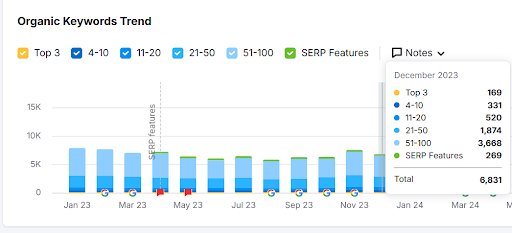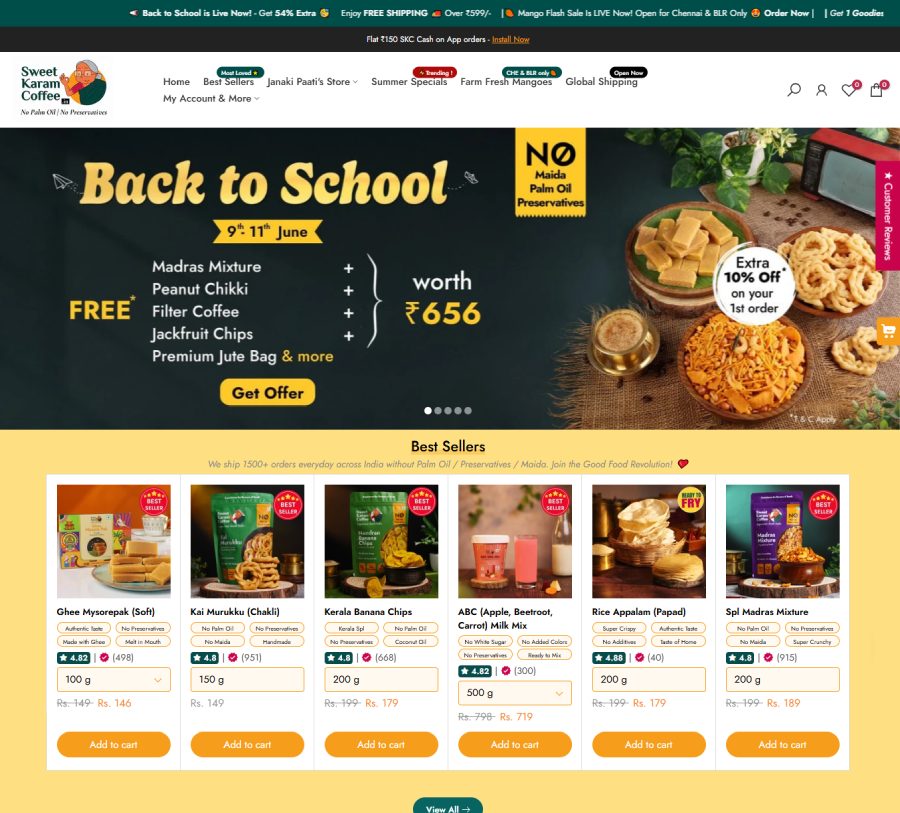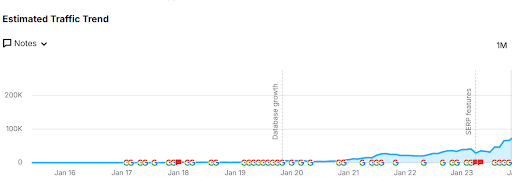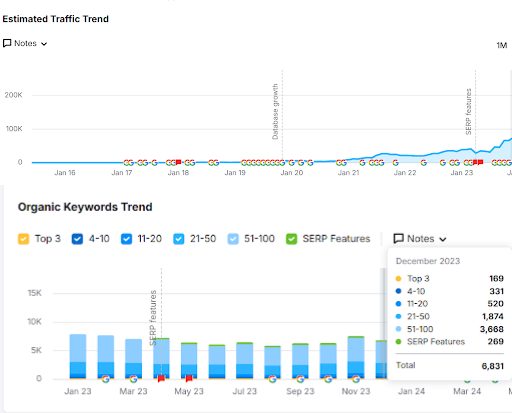case study
Key Metrics Snapshot (Visual – Infographic or Stats Box)
Top 10 keywords grew from 5 to 328
CTR improved from 2.92 % to 5.8 %
More than 50% increase in organic users.
23% increase in organic revenue

1. About Sweet Karam Coffee
Industry: Food & Beverage
Target Market: India
Website: Sweetkaramcoffee
Sweet Karam Coffee was founded in 2015 by Anand Bharadwaj and Nalini Parthiban, a husband-wife duo. The idea of the brand was to share their family’s authentic South Indian snack recipes with a wider audience.
Sweet Karam Coffee offers a carefully curated range of homemade snacks, sweets, beverages, pickles, papads, farm-fresh mangoes, masalas, ghee, and traditional gifting combos. All items are made without preservatives, aligning with the brand’s focus on clean-label, homemade food.
With 90% of products made by home chefs, the brand not only preserves recipes passed down through generations but also empowers local communities by supporting home-based businesses. Sweet Karam Coffee delivers nostalgia-packed treats, without palm oil and preservatives, across the country.

Need Help With Your SEO?
BOOK A STRATEGY CALL

2. The Challenge (Problem Statement)
Sweet Karam Coffee had a loyal base and strong brand recall, but their SEO health was largely brand-led. They needed help shifting from direct traffic to high-intent discovery queries.
Key Challenges:
- 70 %+ of clicks came from branded terms like “Sweet Karam Coffee”
- Low visibility for product-focused generic terms like “Diwali sweets online,” “buy murukku,” “filter coffee powder online”
- Product pages lacked metadata, structured content, and interlinking
- No keyword-focused blog strategy beyond one-off recipe posts
- No festive SEO framework for high-conversion periods
Objective: Grow non-branded keyword visibility, increase discovery traffic, and drive higher revenue via SEO.
3. Our SEO Strategy & Approach
Keyword Research & Mapping
- Identified high-intent keywords across traditional south indian food like mysore pak, kai murukku and other organic products like wood pressed oil and desi ghee
- Focused on category keywords, gift-related searches, and regional searches like “sweets online Chennai”, “South Indian snacks Bangalore”
- Prioritised transactional queries and content with high commercial potential

On-Page Optimisation & Technical Fixes
- Optimised product/collection pages with better meta tags, structured data, alt tags, internal links, and H1s
- Fixed crawl errors and improved Core Web Vitals for a faster mobile experience
- Implemented schema markup for product pages, FAQs, articles, and gift boxes
Backlink & Authority Building
- Acquired backlinks from food blogs
- Enhanced Google Merchant feed for better visibility in product search
- Built link equity around informational + commercial pages
Content-Led SEO Strategy
- Created power pages for Diwali, Pongal, and Gifting, optimised for festive + generic discovery
- Clustered content around “traditional food,” “homemade benefits,” and “regional gifting”
- Added FAQs, voice-search optimised snippets, and seasonal content (summer, back to school, Diwali, Pongal)
- Created SEO-rich Information Architecture (IA) for gifting with traditional food-centric keyword coverage
4. The Results – SEO Impact & Performance Metrics
Traffic Growth: More than 50% increase in organic users.
Ranking Keywords: More than doubled top 100 ranking keywords (3347 to 6831)
Conversion Boost: 23% increase in organic revenue

5. Key Takeaways & Lessons Learned
- Generic & regional keyword strategy significantly reduced branded dependency
- Product discoverability increased through better-structured pages and internal links
- Seasonal SEO pages (Diwali, Pongal) drove both traffic and revenue
- Blog posts built around traditional food habits & how-to terms attracted quality organic users
- SEO success was deeply aligned with the brand’s cultural voice. No aggressive keyword stuffing, no religiously sensitive terms

